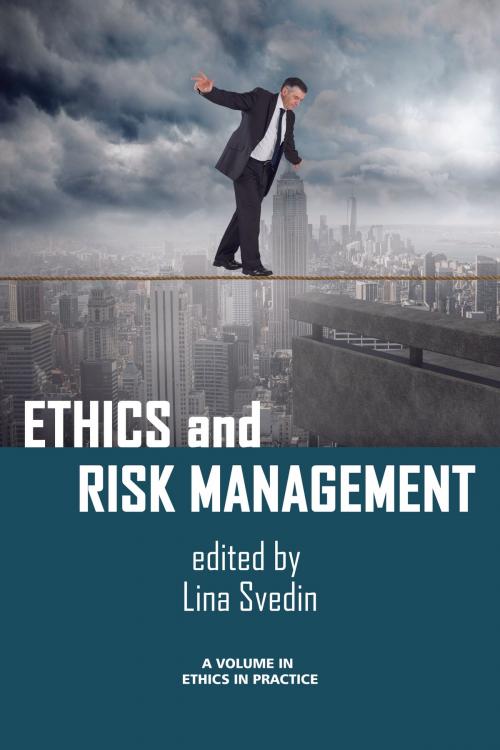Ethics and Risk Management
Business & Finance, Business Reference, Business Ethics, Management & Leadership, Leadership, Management| Author: | ISBN: | 9781681230955 | |
| Publisher: | Information Age Publishing | Publication: | July 1, 2015 |
| Imprint: | Information Age Publishing | Language: | English |
| Author: | |
| ISBN: | 9781681230955 |
| Publisher: | Information Age Publishing |
| Publication: | July 1, 2015 |
| Imprint: | Information Age Publishing |
| Language: | English |
The underlying rationale for this book is to present research that a) highlights the explosively political and deeply divisive issues involved in managing risk and b) address the empirical deficit and theoretical challenges related to managing societal risk ethically. Extant risk management research borrows heavily from engineering, systems theory and business management, and is primarily focused on probabilities, modeling, and abstractions of the value of mitigative action. This research engenders a false sense of objectivity and it depoliticizes fundamental political and democratic questions about the allocation of society’s scarce resources and about the balance of responsibilities between governing institutions and individuals with regard to risk. The quantitative and hardscience focus on risk also keeps a discussion of the consequences of the distribution of risk, resources and responsibilities for real people out of the lime light. The contributors to this book are experts in a wide range of academic fields and in this book they take on the challenge of examining their core research with a specific ethics perspective. They explore the ethics of risk management using theory, cases and data from a range of policy areas, countries and philosophical traditions. This book should be of interest to scholars and practitioners working in fields that deal either implicitly or explicitly with risk. This would include, but is not limited to, scholars and students of public management, public sector ethics, public policy, risk regulation, and risk management. The book deals directly with core problems of management in the public sector, valueconflicts, multiple principals and stakeholders, as well as information analysis and the application of sound and valid decisionmaking processes. The book can be adopted as a core text for graduate courses in public management, public policy, public administration ethics, and comparative politics. It would also work well as an applied theory text in comparative politics; ethics centered courses in political science, as well as more narrowly focused courses on risk, crisis and disaster management. For the practitioner audience, this book pinpoints the ethical stakes, the analytical and managerial challenges, and the necessary tools to meet the many risks that societies face. This book, Ethics and Risk Management, provides a unique take on the realities of costbenefit analysis, efforts to control and regulate risk and risky behavior, as well as the decidedly bounded rationality with which we, as decisionmakers and citizens, perceive and take risks. The work of identifying, understanding, prioritizing and designing effective tools to mitigate and manage risk is an inherently analytical and strategic process best suited to take place before and between crises. Successful risk analysis and management reduces the general occurrence of crises, while the ethical analysis and management of risk serves to reduce the likelihood of subsequent sociopolitical turmoil should a crisis occur. Thus, the investment that any practitioner makes in risk management has the potential to yield both social and political benefits if the analysis and work is done with an eye toward ethics and stakeholder analysis.
The underlying rationale for this book is to present research that a) highlights the explosively political and deeply divisive issues involved in managing risk and b) address the empirical deficit and theoretical challenges related to managing societal risk ethically. Extant risk management research borrows heavily from engineering, systems theory and business management, and is primarily focused on probabilities, modeling, and abstractions of the value of mitigative action. This research engenders a false sense of objectivity and it depoliticizes fundamental political and democratic questions about the allocation of society’s scarce resources and about the balance of responsibilities between governing institutions and individuals with regard to risk. The quantitative and hardscience focus on risk also keeps a discussion of the consequences of the distribution of risk, resources and responsibilities for real people out of the lime light. The contributors to this book are experts in a wide range of academic fields and in this book they take on the challenge of examining their core research with a specific ethics perspective. They explore the ethics of risk management using theory, cases and data from a range of policy areas, countries and philosophical traditions. This book should be of interest to scholars and practitioners working in fields that deal either implicitly or explicitly with risk. This would include, but is not limited to, scholars and students of public management, public sector ethics, public policy, risk regulation, and risk management. The book deals directly with core problems of management in the public sector, valueconflicts, multiple principals and stakeholders, as well as information analysis and the application of sound and valid decisionmaking processes. The book can be adopted as a core text for graduate courses in public management, public policy, public administration ethics, and comparative politics. It would also work well as an applied theory text in comparative politics; ethics centered courses in political science, as well as more narrowly focused courses on risk, crisis and disaster management. For the practitioner audience, this book pinpoints the ethical stakes, the analytical and managerial challenges, and the necessary tools to meet the many risks that societies face. This book, Ethics and Risk Management, provides a unique take on the realities of costbenefit analysis, efforts to control and regulate risk and risky behavior, as well as the decidedly bounded rationality with which we, as decisionmakers and citizens, perceive and take risks. The work of identifying, understanding, prioritizing and designing effective tools to mitigate and manage risk is an inherently analytical and strategic process best suited to take place before and between crises. Successful risk analysis and management reduces the general occurrence of crises, while the ethical analysis and management of risk serves to reduce the likelihood of subsequent sociopolitical turmoil should a crisis occur. Thus, the investment that any practitioner makes in risk management has the potential to yield both social and political benefits if the analysis and work is done with an eye toward ethics and stakeholder analysis.















